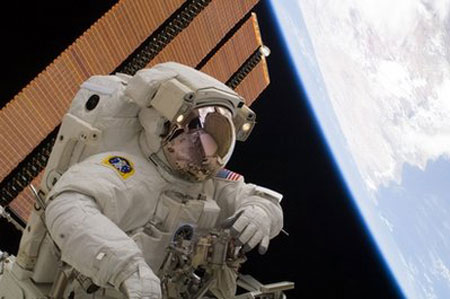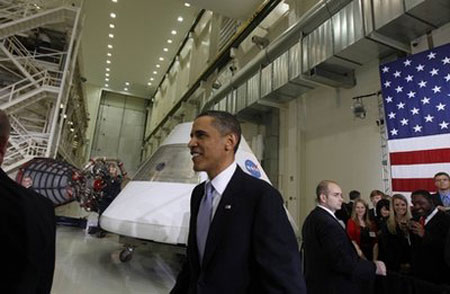America announced new cosmic strategy
US President Barack Obama yesterday launched a series of ambitious goals for the US space industry, including a project to bring people to meteorites and Mars.

Astronaut Clayton Anderson (USA) made a walk outside the International Space Station on April 13.Photo: AP.
AP reported that the White House boss went to Kennedy Space Center and read the speech near the launchers that had brought the first astronauts to the moon. In the speech he said the government would give the US Aerospace Agency (NASA) a series of challenging goals and money needed to implement those goals.
"We hope a new spacecraft capable of carrying out long-range flights will be born before 2025. It will allow us to make manned flights to places farther away than the moon. We will start by bringing astronauts to a meteorite, for the first time in human history , " BBC quoted Obama.
President Obama believes the US can send people to orbit in the mid-30s of this century. Then the US will let astronauts land on the red planet. He hopes the new plan will receive widespread support from the people.

President Barack Obama left the Kennedy Space Center after speaking on April 15.Photo: AP.
The White House suffered a lot of criticism since Mr. Obama announced the cancellation of the Constellation Program in February. This is a project to build a new generation of spacecraft to replace the shuttle fleet. Mr. Obama said the attempt to build Orion - the name of the new spacecraft - and the Ares boosters cost too much money and time.
"We not only want to continue the chosen route, but we also want to have a leap in the future," he said.
However, the head of the United States also showed a concession in the speech. He pledged the development of the Orion ship will continue. In the early stages, Orion can be designed to perform the "lifeboat" mission on the International Space Station. Then this version will be upgraded gradually to become more complex in the future.
- America spent a billion dollars to get cosmic dust
- America announced 6 cosmological models
- Oracle announces strategy to expand market leadership
- Nissan produces fuel-cell vehicles for environmental protection
- Uncommonly rare spiral-shaped structure of cosmic dust
- Southeast Asia should learn Chinese technology strategy
- NASA creates cosmic dust in the laboratory
- America - Japan cooperates to monitor pillar garbage
- Central America suffered from many natural disasters
- Discovering 3 million years old 'cosmic jade' in America
- Platinum scattered around the Earth: From the asteroid that nearly destroyed humanity?
- Biofuels: An appropriate strategy?
 Van Allen's belt and evidence that the Apollo 11 mission to the Moon was myth
Van Allen's belt and evidence that the Apollo 11 mission to the Moon was myth The levels of civilization in the universe (Kardashev scale)
The levels of civilization in the universe (Kardashev scale) Today Mars, the sun and the Earth are aligned
Today Mars, the sun and the Earth are aligned The Amazon owner announced a secret plan to build a space base for thousands of people
The Amazon owner announced a secret plan to build a space base for thousands of people